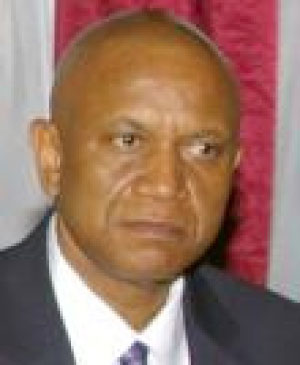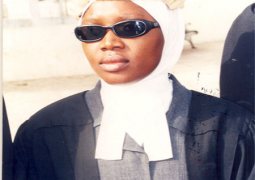
With nominations closing this evening, in the run-up to the March 23 GNOC elections, there are increasing indications that the bitter row over the composition of the electoral list that marred the 2010 presidential bye-elections will resurface.
According to sources, fresh disagreements over the electoral list emerged Friday during the filing of nomination papers by Sheriff Jammeh, president of the Gambia Lawn Tennis Association, who arrived at Olympic House with nominations from 14 associations.
Mr Jammeh’s camp also nominated Pa Alieu Jallow for secretary general, Johnny Gomez of the cricket association as 1st vice president, Musa Cassa Taal of the volleyball association as 2nd vice president and Martin Gomez of secondary school sports as treasurer.
Each nomination can be backed by as little as one national association.
But Jonny Gomez of the cricket association, one of the national associations backing Jammeh, said when he and his team arrived to file papers they found ‘a junior staff’’ in the person of finance officer Muhamed Janneh who received their papers but rejected the nominations from six national associations, claiming he had instructions not to recognize those national associations.
“We have been suspicious of the entire exercise of the preparation of this congress because basic requirements of the rules were not followed,’’ Gomez alleged.
He said: “First, the circular that was sent to all national associations informing them of the congress was not accompanied by the list of the eligible voters as required by the constitution.’’
Another source of potential conflict is the presence of a constitution currently being distributed to national associations by the GNOC, which is said to have the blessings of the IOC.
“We and many national associations have not been present and are not aware of the process leading to the drafting or adoption of that document,’’ Gomez further alleged.
The constitution, now circulated to all national associations, contains important changes to the composition of the elective members of the GNOC bureau with anyone aspiring to contest the secretary general position now required to possess an academic degree.
Mr Gomez said everything in the constitution is tailor-made to suit the present occupiers of the bureau.
He also accused the current GNOC leadership of trying unlawfully to delete from the voters’ list national associations they know will not support them in elections, such as the weightlifting association which the GNOC said cannot vote because they had been suspended from the membership of their parent association, the IWF, for not paying their subscription.
“What has non-payment of international subscriptions has to do with local issues, especially when the National Sports Council recognised the weightlifting association as a bona-fide association that meets the criteria of national associations,’’ Mr Gomez queried.
Jonny Gomez also said the present leadership of the GNOC is using all means in their ambition to stay in office even to the extent of calling and contacting the international federations of some national associations on a fishing expedition looking for things that they could use to bar their opponents from voting.
“They are fond of internationalizing local issues to garner support because they know the majority here does not support them,” he said.
“In fact both the sports tribunal report and the subsequent six-point agreement on the GNOC saga excluded all those trying to stay in office from contesting.’’
Finally, Mr Gomez called on the Ministry of Sports to take up its responsibilities by implementing the recommendations made by a commission of enquiry which probed the initial GNOC saga.
Some of those recommendations include the banning from holding public office of top officials including the incumbent Momodou Dibba.
However Sports Minister Jammeh is on record as saying he would not implement those recommendations but would instead keep faith with the six-point agreement signed last year to put an end to the GNOC impasse.
Contacted to react to these allegations, Peter Prom secretary general of the GNOC, began by emphasizing that any decision by the GNOC, be it administrative or otherwise, including the entire process of drawing up the voter list, was done in consultation with the IOC.
Mr Prom said: “When we want to establish the eligibility of a national association to vote in the GNOC elections, we consult the IOC who advises us on the modalities, and in accordance with our constitution, we determine whether that given association is affiliated with the international federation.
“For example, when we were drawing up the list, the GFA Normalization Committee was excluded but when the IOC advised us that FIFA has recognised the GFA Normalization Committee, we put them back on the list.
“However, when we contacted the International Rugby body we discovered that the Gambian association is not affiliated with them. We also received a mail from the International Weightlifting Association saying that the Gambian association has had its membership suspended owing to failure to pay their subscriptions.
“In fact we felt so bad when national associations encounter this kind of problems that we plan to help them settle their contributions for them to avoid it affecting Gambian sports.
“So we conduct these researches not to harm anyone but to ensure that we are fair to all who meet the requirements of the GNOC and the IOC.’’
Mr Prom said further that he did not know of any other association whose eligibility is questioned apart from these two.
Asked why the notice to the stakeholders informing them of the elections was not accompanied by the voter list as required by the rule, Mr Prom said the chance for the stakeholders to view the electoral list remains paramount to the process and all delegates would see the list to approve or disapprove it on election day, adding that it is also sent to the IOC for advice.
“In fact the general assembly of delegates have the right to override any decision that we take in processing the list as they are the highest body,’’ Prom assured.
On the allegation that most national associations were not aware of the process that led to the adoption of the present constitution, Mr Prom denied such an allegation.
He said: “Every national association was notified but some preferred not to attend and those who turned up went ahead to adopt the constitution and it is now binding as the document to guide the running of the GNOC.
“You cannot force people to come to a forum at gunpoint, no; you follow the rules by notifying them, which we did. And they could still have come back to us and raise their objections and concerns. But they chose to boycott the entire process.’’
Quizzed on whether the GNOC is not inviting another dispute by not recognizing national associations who are duly registered and recognised by the National Sports Council, Mr Prom said the level of the National Sports Council is a fundamental requirement but it is not all that matters to be part of the GNOC general assembly.
“The national associations must also be an Olympic sport and properly affiliated with their international federations to be able to be considered as eligible to be part of the GNOC general assembly.
“This is what should be made clear,’’ he said.
Asked what his bureau knows and is doing about the sports tribunal recommendations which called for the banning of senior officials of the GNOC from holding office, Mr Prom said the issue of the sports tribunal report has been buried and forgotten after a meeting between all parties and the line government ministries.
“Visiting that will not serve any purpose but to dig up dirt all over again,’’ he said.
But when it was put to him that in place of the tribunal report the agreed six points should be implemented including a clause for the present GNOC leadership to pass control to a younger generation of leaders, Mr Prom agreed that was the case but added: “We are working on the succession process as agreed.’’
But when asked whether the coming election is not the best opportunity to implement that by all of them deciding not to contest, Mr Prom said the process has to be gradual.
After all it is the general assembly which decides and brings forward their candidates; they are the ones who decide who runs the GNOC and besides you need institutional memory anywhere.
“For example, when the GFA needs to pass to the next generation they brought in old people like OB Conateh and others because of their institutional memory,’’ Mr Prom said.
He went on to clarify that the GNOC deployed a neutral member of staff whose position is not subjected to the March 23 elections, to show integrity and impartiality in the whole process.
“You do not expect me to preside over the processing of nominations because I am a candidate. I have not even set eyes on any nominations yet. Is that not fair enough,’’ Mr Prom asked.
He ended by emphasizing that the GNOC is here for all and in the interest of all national associations and that all must come together and work for the advancement of Gambian sport.


